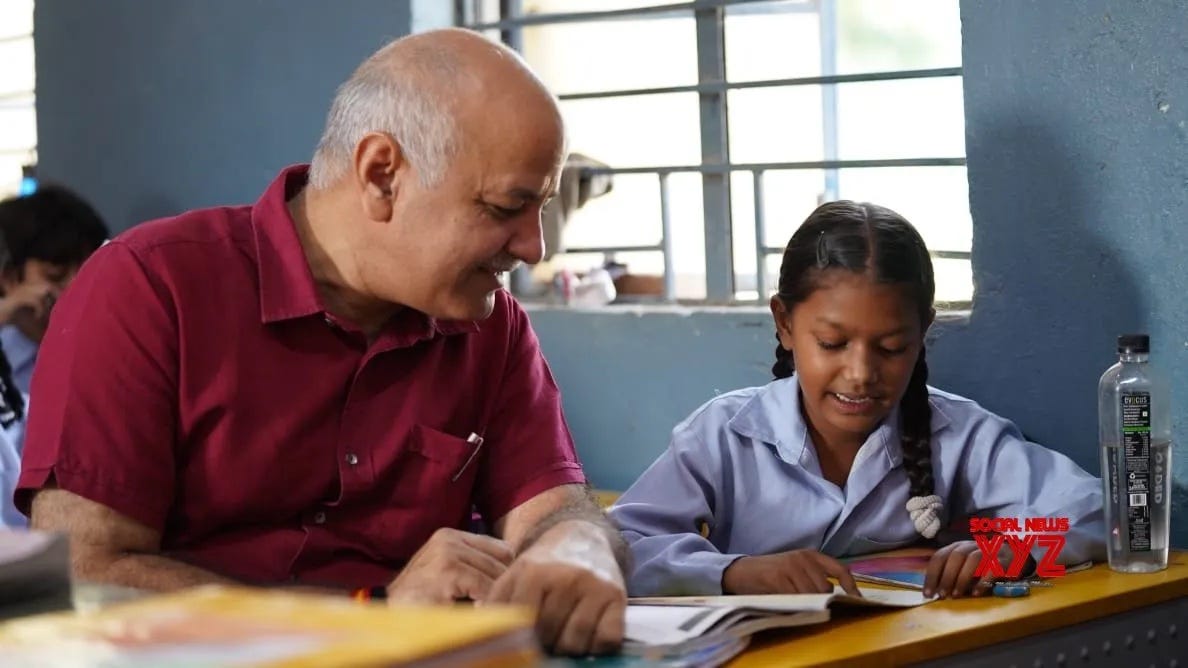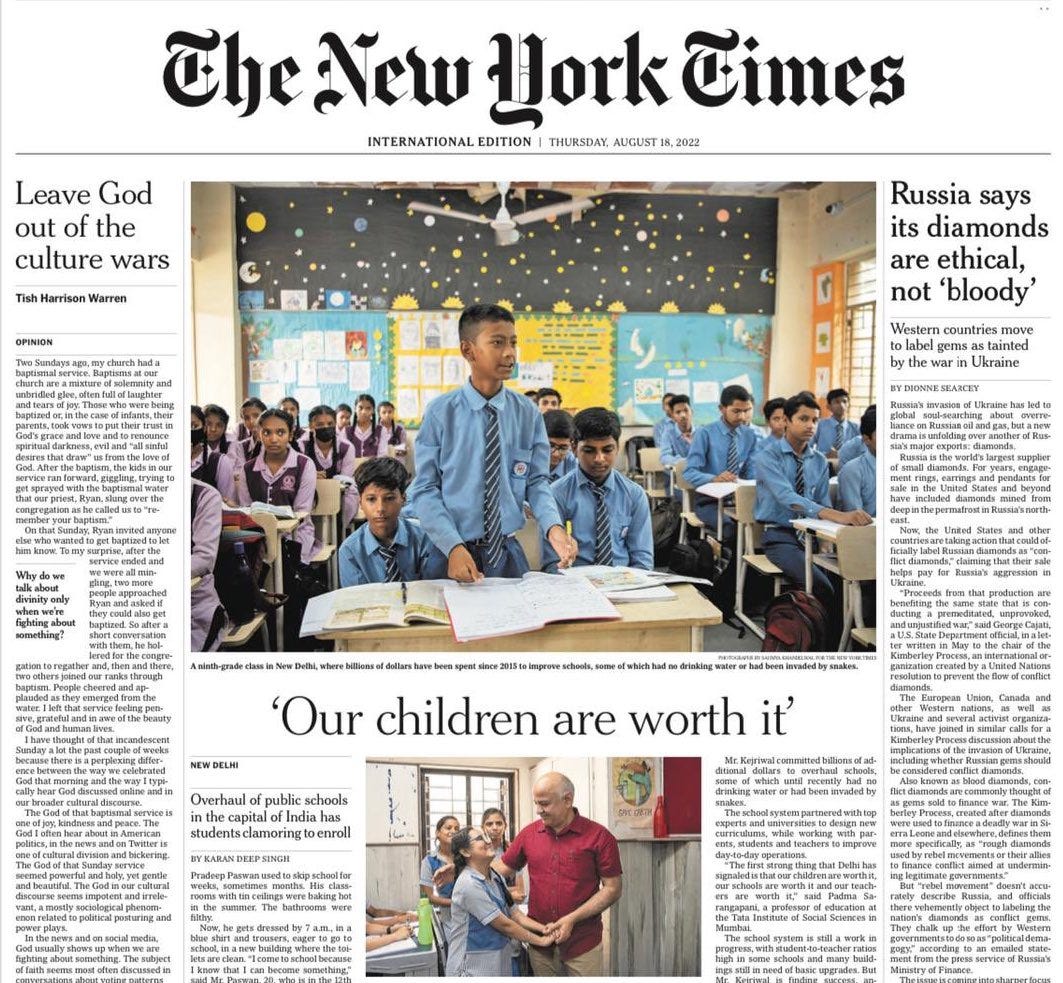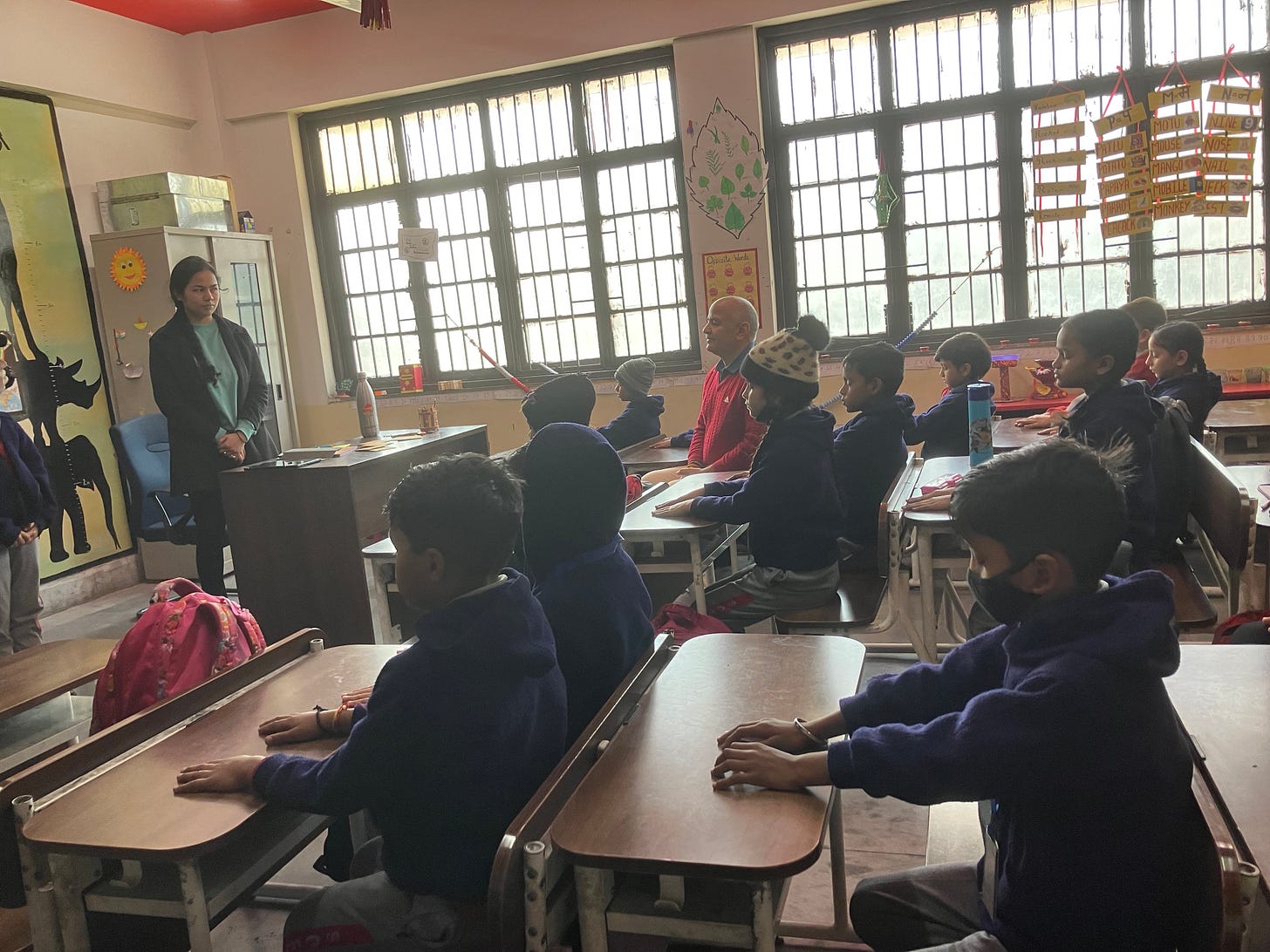⚖️ One of the World’s Best Education Ministers is in Jail. We Need a Wake Up Call on the Power of Politics in Education Reform.
What we can learn from Manish Sisodia's case in India.

When the New York Times chose to highlight the world’s most groundbreaking education reforms, they picked Delhi, India. A 2022 front page article featured politician and Deputy Chief Minister Manish Sisodia. The next year, Sisodia gave a keynote presenting his model to the world’s annual gathering of education Ministers. In 2021, Delhi’s Happiness Curriculum received the equivalent of the Nobel Prize for education innovation.
Delhi’s reforms were part of a larger effort by an upstart political party, Aam Aadmi Party (AAP), to gain power in a country dominated by the BJP, India’s ruling political party. The new party made education their single biggest priority; politicians rarely do this. AAP made the world’s second largest city a lighthouse for education reform in the Global South.
But instead of being rewarded, AAP was likely punished in a bid by the BJP to increase their power. On February 26, 2023, Sisodia was suddenly arrested.
That month, I spent six weeks in India covering Sisodia’s story for a chapter in my forthcoming book about how to create systems change in education. I observed staff meetings, workshops with Delhi NGO’s to develop new interventions, public events to highlight student successes - and spent many hours interviewing Sisodia.
His arrest is a critical issue with global implications, but not enough people are paying attention. Sisodia’s case shows us how too often, politics is left out in conversations about education reform - though politics is often the key factor that determines whether reforms succeed or fail.
The BJP has led some impressive education transformation, particularly in literacy and numeracy (Central Square Foundation supports reforms in BJP-led Haryana and other states, and BJP Prime Minister Narendra Modi made FLN a priority in his National Education Policy). But what unfolded in Delhi is a critical case study for us all, because it shows how the leaders who take on the most important work of changing an education system, can become pawns in a political game. It is children who suffer as a result.
A Bright Spot for Education Innovation
When AAP won control over Delhi and Sisodia became Deputy Chief Minister in 2015, he built a team to design and deliver a comprehensive set of reforms to the 1,007 schools under AAP’s control. They increased Delhi’s education budget 106%, renovated school infrastructure, hired more teachers, and purchased vital supplies. They partnered with India’s leading education NGO’s and flew principals to Finland to learn best practices. They created new curriculums to equip students with socio-emotional learning and entrepreneurship.
These reforms show promising results that currently reach 1.85 million students a year. Delhi students achieved significantly better scores than their peers countrywide in English, science, mathematics and social sciences in 2017 and 2021. According to Delhi government data, students’ test scores improved significantly, with grade 12 national exams pass rates improving from 87% in 2012 to 100% in 2021 (the New York Times reported).
It is difficult to overstate just how unusual this kind of rapid systems change process is. As Yamini Aiyar, an Indian education expert, co-wrote in a book about AAP’s reforms, they were “arguably the first time that any government (national or sub-national) in India had chosen to tackle head-on the challenge of improving learning quality in government schools.” And it had a ripple effect beyond Delhi. Political parties in other states, such as Telangana and Tamil Nadu, took notice - they visited Delhi and say they will learn from AAP’s successes. Even Prime Minister Modi went on a school visit ahead of Gujarat’s 2022 elections. Manish Sisodia helped make education a key issue for politicians in India.

This progress was interrupted when Sisodia was arrested in February, on complex corruption charges related to alcohol sales. While the Central Bureau of Investigation and the BJP argue that the arrest is justified, critics argue that the CBI is essentially controlled by India’s central government. Considering the other ways that the BJP is using the judicial system, Sisodia’s arrest is likely a tool for the BJP to weaken AAP. (It doesn’t seem to be a coincidence that CBI agents raided Sisodia’s house on the same day the New York Times article was published, and alongside this, India’s central government attempted to slow AAP’s ascent by trying to revoke the responsibility for service delivery from the Delhi government.)
The attack on Sisodia is part of the BJP’s larger wave of political repression to weaken opposition parties, journalists and civil society organizations ahead of next year’s elections. The ruling party has arrested and sidelined politicians and critics (like Rahul Gandhi, who was disqualified from elections and recently reinstated, and at least 35 journalists in Kashmir). Modi’s government has increasingly censored the press, such as banning a BBC documentary about his alleged role in the Gujarat riots and pressuring Twitter to ban over 120 journalists and activists who spoke out about India’s Sikh community.
The charges against Sisodia are likely a front for a political takedown. Why would Sisodia suddenly become corrupt after spending his entire career campaigning against corruption as a journalist and activist? This is a man who wears simple inexpensive shoes, regularly goes on ten-day meditation retreats, and has a painting of Gandhi in his living room. His father was a government schoolteacher. Most days from 2015 to his arrest, he dropped into schools for surprise visits, and barely slept because of how hard he was working. His party’s symbol, a broom, represents their commitment to sweep out corruption. It makes no sense that Sisodia would suddenly become corrupt.
Political Gain at the Cost of Children
Sisodia has been in jail five months and his case drags on, as he was denied bail. Atishi, another AAP leader, took over as head of Delhi’s education portfolio, and her team is carrying on Sisodia’s legacy. But reforming a struggling school system in India is already challenging, and the arrest made it harder. Because of the climate created by India’s ruling party, many officials in Delhi’s bureaucracy are afraid to continue supporting AAP’s reforms process, because of potential repercussions from India’s central government. School leaders are demotivated and scared, because of what happened to Sisodia. Partner NGO’s are afraid to talk about their work with AAP publicly - because their licenses could be revoked. (India’s central government has increasingly restricted NGO’s who are critical of Modi’s government; since 2011, the Ministry of Foreign Affairs revoked permits from over 20,000 NGO’s.)
Although Delhi is still an impressive reform story, the transformation process faces many more obstacles post-arrest because of the way Sisodia’s case became a political lightning rod. As a result, it will take longer for Delhi’s youth to receive the education they deserve.
Sisodia’s case also has critical implications for education reform worldwide. We have so few examples where politicians prioritized and successfully implemented education reform in Global South contexts. We need Delhi’s reforms to help prove how it can be done.

A Culture of Silence
Actors who could potentially push Modi’s government to release Sisodia, are too afraid to do so because it could put their programs at risk. NGO’s cannot criticize the BJP publicly because they could have their licenses revoked or leaders arrested. Academics won’t talk about Sisodia’s case publicly, because it could put their research permits in jeopardy. The most powerful foundations who fund education in India are afraid to speak out to support AAP, because they don’t want their programs in BJP-led states to be shut down or lose their influence with the central government.
Other countries who could encourage India’s government to release Sisodia, such as the US and UK, won’t publicly pressure the BJP because they need India to help counter China’s influence. When Prime Minister Narendra Modi arrived in the US capitol last month, President Biden literally rolled out the red carpet and welcomed him with a state dinner, the highest honor the US can bestow on a leader.
Even when I tried to bring this issue into the global agenda, I failed. I co-authored an op-ed with Lucy Crehan (an education expert who wrote a brilliant book about why certain education systems perform better than others). We pitched it to dozens of publications and a leading think tank, and they all declined. Perhaps for global newspapers, education is seen as less urgent - alongside the threats of Russia’s invasion of Ukraine, rising ocean temperatures, the rise of AI, and pandemics.
But education is essential, as the world’s population grows quickly and millions of youth leave school with few skills for work. And Sisodia’s case is a watershed moment marking how a political party can prioritize political gain over supporting education reform that benefits children. His arrest not only harms the roughly 60 million people who live in AAP-controlled areas (Delhi and Punjab). It impacts the future of the world’s largest country, with 1.4 billion of the world’s 8 billion people. And it makes it harder for AAP to create a reform success story in one of the few places in the Global South where politicians committed to quickly transform education.
We Must Speak Up
If the world’s most powerful funders, NGO leaders, and think tank experts are all too afraid to defend Sisodia publicly, who will? What can we do when something like Sisodia’s arrest happens?
Across Latin America, Africa, South Asia, and Southeast Asia, too often we focus on what interventions “work” to improve outcomes (with efforts like GEEAP). But even if we know what kind of curriculum or teacher training policy is needed - what determines whether it goes to scale is political issues. However, we are too afraid to talk honestly about politics.
So are we just going to sit by as one of the few politicians who tried to do the right thing - and was punished for it - sits in jail?
We need to have the courage to talk about it. If you have connections to the BJP or CBI but can’t speak publicly, advocate with leaders behind closed doors. If you are a funder, invest in NGO’s who support AAP so that partners don’t abandon the reforms process. If you have influence in India’s institutions and courts, help ensure that Sisodia is treated fairly. (If you have ideas of other steps we can take, please comment or hit reply.)
AAP’s reforms show what is possible when there is strong political will to tackle broken education systems. But instead of Sisodia’s leadership helping to solve one of the greatest problems facing our world, he is locked in a jail cell. I hope that soon Sisodia will be back where he belongs - trying to ensure that all children, even the most marginalized, can access a quality education.
I want to see a world where politicians who try to fix schools are rewarded, not arrested.

🌍 This is part of my journey to write a book about how to create systems change, with examples from the Global South's education bright spots (Brazil, Colombia, Kenya, Nigeria, Pakistan, India and Indonesia). For more stories, sign up for my newsletter (edwell.substack.com) and follow me on LinkedIn. 🌏



This article has really touched me and made me think deeply. It's sad to see that important work often faces resistance from those against it. It appears, keeping power is more important to them than people's lives. Unfortunately, these are the challenges education stakeholders face when it comes to managing interventions. Success isn't guaranteed by how innovative your ideas and theories are if you can't manage complex political systems.
Thanks for also spotlighting the fact that education is not given enough importance worldwide, especially when compared to issues like war and climate risks that take precedence. Figuring out how to elevate education to the same level of importance is a challenge that requires our collective efforts and thoughtful consideration.
Your insights have prompted me to ponder on the steps we could take to make a positive change.
Good and factual write up. Please keep trying on world platform to get released Mr Sisodia from jail to save future of children.